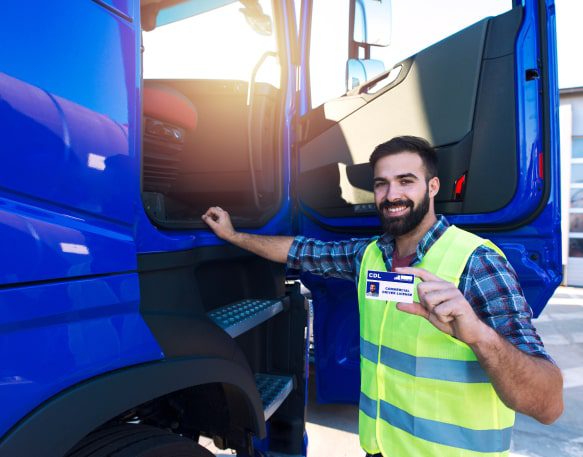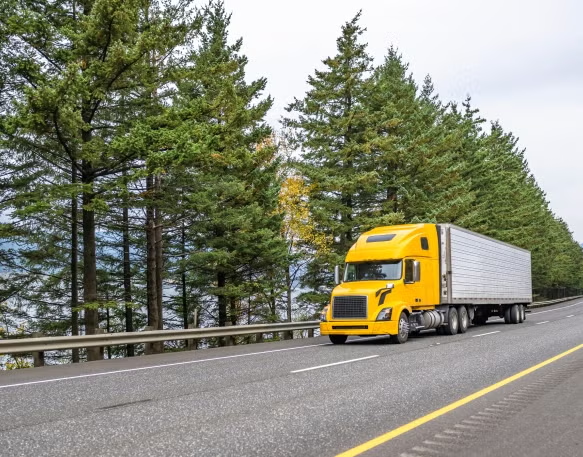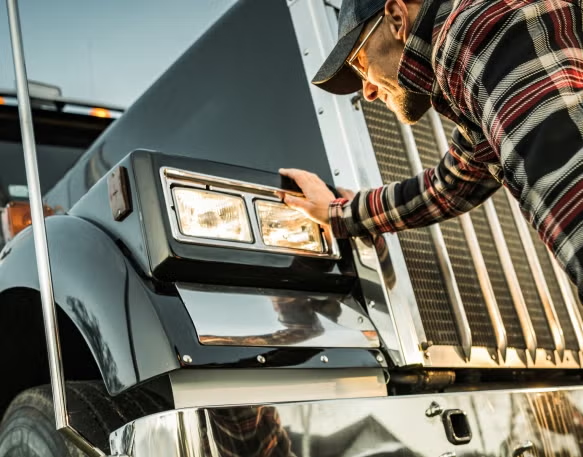Commercial truck drivers are in high demand, and getting commercial driver’s license (CDL) training could be your path to building a recession-proof career with real earning potential. A CDL license allows drivers to operate commercial vehicles, from delivery trucks to tractor-trailers, offering a range of opportunities in the trucking industry. A Class A CDL, in particular, is required for drivers operating the largest vehicles, such as tractor-trailers and heavy trucks.
In this guide, we’ll share everything you need to know about CDL requirements and which driver’s license class might be best for you.
How to become a truck driver
If you’re considering becoming a truck driver, you’ve likely weighed the pros and cons of getting a CDL. Obtaining a CDL, especially a Class A CDL, qualifies you to drive a wide variety of trucks. However, you’ll need to complete CDL school, a CDL test, and meet other requirements before you can start earning.
If you’ve been wondering about commercial license requirements, here are the main steps you’ll need to take to become a CDL truck driver:
- Know the job requirements: Different truck driving jobs require different certifications. For example, hauling hazardous materials requires special Department of Transportation (DOT) certifications beyond a CDL.
- Talk to a truck driver: Speak with experienced drivers to understand what the job entails, including life on the road and the specific job requirements.
- Meet the requirements: CDL training typically requires a GED or high school diploma, and you must be at least 21 years old for interstate driving (or 18 for intrastate). You’ll also need proof of residency, a medical examination, and a clean driving record.
Once you meet these requirements, find a reputable CDL school, pass your exams, and then look for a truck driving job. There are plenty of options, including working for a company or becoming an owner-operator.
Differences between CDL vs. Non-CDL driver’s licenses
You might be wondering “What is commercial driving?” Do all driving jobs require a CDL driver’s license? Commercial driving is simply driving in exchange for money, as opposed to getting in your car and driving to work (which you still need a non-commercial license to do). Commercial driving does not always require a CDL license. There are jobs such as rideshare driving, driving a small moving truck, some types of mail carriers, and delivery drivers that do not require CDL training—though they may require other types of training. Here are the main differences between CDL vs. non-CDL driver’s licenses.
CDL licenses
CDL licenses require specialized training, testing, and medical clearances and are usually intended for people who intend to operate larger vehicles or transport more than eight passengers for compensation. There are three main types of CDL driver license classes.
| License Type | Vehicle Types | Weight Limits | Job Opportunities |
| Class A CDL | Combination vehicles (e.g., tractor-trailers, flatbeds, livestock carriers) | GVWR of 26,001+ lbs, towing over 10,000 lbs | Long-haul trucking, heavy freight hauling, owner-operator |
| Class B CDL | Single vehicles (e.g., dump trucks, straight trucks, large buses) | GVWR of 26,001+ lbs, towing up to 10,000 lbs | Bus driver, delivery truck driver, construction vehicle operator |
| Class C CDL | Smaller vehicles (e.g., passenger vans, small HazMat trucks) | GVWR less than 26,001 lbs, transporting 16+ passengers or hazardous materials | Passenger van driver, small HazMat transport, local deliveries |
What is a Class A CDL license?
A Class A CDL license, also known as a Class A CDL driver’s license, is the most comprehensive type of commercial driver’s license available, allowing drivers to operate a wide range of vehicles. So, what is a Class A CDL? It is an all-purpose license that covers all the privileges of a Class B and Class C CDL, and more, making it the most versatile license for commercial drivers.
With a Class A CDL license, you can operate vehicles with a gross combination weight rating (GCWR) of 26,001 pounds or more, provided the towed vehicle exceeds 10,000 pounds. This includes tractor-trailers, tankers, livestock carriers, and flatbeds. A Class A CDL also allows you to drive heavy farm equipment, haul hot shot loads, and operate large passenger vans, giving you the flexibility to take on various types of jobs.
There are many benefits of obtaining a Class A CDL driver’s license—it offers access to the highest-paying jobs in the trucking industry and provides a broad scope of career opportunities, from long-haul trucking to specialized freight. Whether you want to work for a trucking company or start your own business as an owner-operator, having a Class A CDL opens doors to diverse and well-paying driving positions.
What is a Class B license?
A Class B CDL license allows you to operate a single vehicle with a gross vehicle weight rating (GVWR) of more than 26,000 pounds or a three-axle vehicle weighing over 6,000 pounds. It’s designed for drivers operating medium to heavy-duty trucks that don’t require the versatility of a Class A CDL.
With a Class B CDL license, you can drive vehicles such as straight trucks, box trucks (like delivery trucks), dump trucks, large buses (including city transit, school buses, and tour buses), and some heavy construction equipment. Plus, a Class B CDL allows you to tow a vehicle weighing up to 10,000 pounds. It also includes the ability to operate any vehicles classified under Class C.
The benefits of getting a Class B CDL driver’s license include access to a wide range of job opportunities in industries such as public transportation, delivery services, waste management, and construction. Class B CDL holders often find work as bus drivers, delivery truck drivers, and utility vehicle operators. These positions tend to offer steady work hours, local or regional routes (meaning you’re home more often), and the opportunity to work in specialized fields without the need for extensive over-the-road travel that comes with Class A CDL positions. For individuals seeking a stable career in commercial driving without the commitment of long-haul routes, a Class B CDL provides an excellent pathway.
What is a Class C license?
A Class C CDL license is designed for drivers who need to operate vehicles that are not covered under Class A or Class B CDL categories. Typically, a Class C CDL is used for smaller commercial vehicles that transport passengers or hazardous materials in quantities that do not require a Class A or B license.
With a Class C CDL, you can drive vehicles under 26,001 pounds, including passenger vans that carry 16 or more passengers (such as shuttle buses) and vehicles used to transport hazardous materials as defined by federal regulations. Additionally, you may operate standard cars, small trucks, and any vehicle with a trailer that does not exceed 10,000 pounds. This type of license can be commercial or non-commercial, depending on the specific use.
The benefits of a Class C CDL license include job opportunities such as shuttle bus driver, small passenger transport operator, and delivery driver for specialized goods like medical supplies or hazardous materials. Class C CDL opens up career paths in industries like transportation, healthcare, and public services, where the need for smaller passenger or specialized cargo vehicles is prevalent. This license is ideal for those seeking a commercial driving role with local routes and a more predictable schedule, often without the extensive training requirements needed for larger commercial vehicles.
What are the advantages of a CDL?
A commercial driver’s license offers several advantages, making it a valuable asset for anyone interested in a career in trucking or commercial driving:
- High demand and job security: CDL truck driver jobs are consistently in high demand, providing some of the lowest unemployment rates of any industry in the U.S. Regardless of the type of driving you prefer, there are always opportunities for CDL holders.
- Versatility in vehicle operation: With a Class A CDL, you can drive nearly any commercial vehicle, from tractor-trailers to smaller trucks, providing flexibility in your career options. Whether you want to be an over-the-road (OTR) truck driver or a hot shot trucker delivering small, time-sensitive loads, a CDL opens the door to a variety of roles.
- Career flexibility: CDL training allows you to work in the trucking industry in any capacity that suits your preferences. You can choose between long-haul routes, regional driving, or local deliveries based on your lifestyle needs.
- Military CDL waiver: New federal regulations allow State Driver’s Licensing Agencies to waive CDL training requirements for military personnel with at least two years of safe driving experience in a large truck or bus. This waiver can help veterans transition more easily into a civilian driving career, though specific eligibility depends on state requirements.
- Earning potential: CDL truck drivers, especially those with specialized skills or endorsements, often enjoy competitive wages and earning potential, with opportunities for bonuses based on experience, safety records, and delivery performance.
Independence and travel opportunities: Many CDL drivers appreciate the independence that comes with life on the road, along with the opportunity to travel and see different parts of the country while getting paid.
How to get a CDL
If you’re interested in getting your Class A commercial driver’s license there are a few steps to take. First, you should become familiar with the industry and figure out what types of trucking industry jobs appeal to you. Then, you should make sure you meet all the requirements for obtaining a commercial driver’s license. Finally, it’s time to start looking into CDL school.
Finding a reputable CDL driving school is an important part of the process. There are a few things you should look for when you are choosing a training program:
- Cost: Getting CDL training could cost you anywhere from $3,000-$10,000. However, many companies and schools offer financial aid. Look into financial assistance and on-the-job training to avoid going into debt.
- Length: Some schools will offer you training in as little as two weeks. That’s often not enough time to learn everything you need to know to pass CDL certification tests.
- Faculty: Make sure your CDL driving school has instructors with strong resumes in the industry and small class sizes. You shouldn’t be training with more than four other students.
- Testing: To get your commercial driver’s license, you’ll need to take a written test and a driving exam. Find out what happens if you don’t pass the first time. Will the program offer additional training?
Once you’ve chosen the right CDL driving school, you’ll take the written CDL permit test at the DMV, which then allows you to train with a CDL-certified driver. After you pass the CDL permit test and a physical examination, you’ll learn everything there is to know about being a commercial driver, from backing up, driving, and conducting pre-trip inspections. After this training, you’ll take a final driving exam and a test on your pre-trip inspection skills. When you pass these tests, you’re ready to look for CDL jobs as a fully qualified truck driver.
Earn your CDL and hit the road
If you’re exploring the differences between CDL and non-CDL driver’s licenses, understanding the Class A CDL is crucial for aspiring commercial truck drivers. A Class A CDL allows you to operate a combination of vehicles, essential for long-haul trucking. For those starting their own trucking business, DAT Authority simplifies compliance, while the DAT load board helps you find top-paying loads with ease. Earning your CDL opens the door to numerous opportunities in the trucking industry, whether you’re driving for a company or starting your own business.
Get on the road with DAT
Got a CDL and looking for loads? You’ll need a load board to find the best freight to get you moving. DAT load board is the largest freight marketplace in the industry, with over 644,500 new posts every day. Try it out today!




